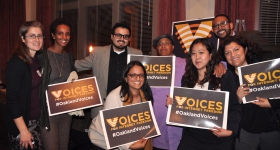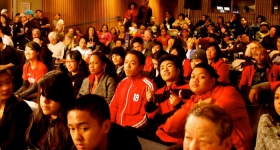Originally posted at New America Media.
By
Viji Sundaram
Maung Bwar, a 60-year-old refugee from Myanmar, and his wife, Ma Aung,
57, have just finished a wellness class at the Asian Health Services
located near downtown Oakland.
The subject on this day is depression, and it resonates well with Bwar and fellow refugees in attendance.
“That’s what I have,” he said in his native Karen, speaking through an interpreter with his hand placed on his heart.
Bwar
is convinced that what caused it was his having to leave behind in the
Thai refugee camp that had sheltered him and his family for nearly a
decade three of his five children, 10 grandchildren and a slew of other
relatives and friends. Only two of his younger children were permitted
to come to the United States with him and his wife as refugees two years
ago.
“I think of them a lot, I miss the family structure I once
enjoyed,” Bwar said, adding, “I only came to this country to give my
children a better life.”
As US Secretary of State Hillary
Clinton makes her historic visit to the Southeast Asian country, hoping
the resource-rich nation will throw off 50 years of military
dictatorship as its leaders have indicated might happen, hundreds of
refugees like Bwar, who once witnessed brutal oppression from the junta
back in their homeland, are living in social isolation in the United
States, facing language barriers and health issues while trying to make
ends meet.
A report released earlier this week by researchers at
San Francisco State University and the Burma Refugee Family Network,
found that nearly 60 percent of Oakland’s refugees from Myanmar
(formerly known as Burma) are living in extreme poverty. Since 2007,
thousands of them have been resettled in the United States, some 400 of
them in Oakland.
“These refugees from Burma are facing dire
circumstances,” observed Russell Jeung, associate professor of Asian
American Studies at San Francisco State University, who pulled in his
students to survey 194 refugees from that country to assess the
community’s needs.
“The recession and government cuts in adult
English classes mean that even though they want to work, these refugees
have no opportunity to learn English or workplace skills in order to
adapt to life in the US,” Jeung said.
Many of the refugees here
are from the Karen and Karenni ethnic groups that originated from some
of the poorest and least developed states in Myanmar. The two groups
were also targeted by the junta, in a bid to suppress their demand for
limited autonomy.
While he was growing up, Bwar said schools in
the communities of Karen and Karenni were destroyed by Myanmar’s
military leaders, leaving him and his fellow villagers unable to access
education.
Many of the children in other communities could not attend school because of the turmoil around them.
“We
lived in constant fear of the junta and spent our days fleeing from
them,” said Muang, 59, another Oakland-based refugee who, like many from
his native land, goes by only one name.
Muang learned to read
and write Burmese and a smattering of Karen in the few years he attended
grade school and later, with the help of some caring Buddhist monks.
But trying to learn English here in Oakland has been a challenge, he
acknowledged.
“It’s not easy to learn English,” he said in Burmese.
“Once [English as a second language] class is over, I forget what I learned,”
said 22-year-old Muang Aung, Maung’s son, who’s also a refugee and the
father of a 5-year-old son.
Lack of English language skills has
prevented many of the refugees from landing jobs and even seeking health
care, said 29-year-old Kwee Say, who interprets for both the Burmese
and Karen-speaking refugees at the Asian Health Services.
She
herself arrived in Oakland as a refugee back in 2004, armed with English
skills and a determination to earn a degree from a US. university.
“Knowing English was a big help,” Say said. “It helped me earn a degree” in biochemistry and science from U.C. Davis.
The
needs assessment report found that 38 percent of Oakland’s refugees
from Myanmar speak no English at all, while 28 percent of them spoke
English poorly.
It also found that 63 percent of them are unemployed, and those who are employed, are in low-paying jobs.
The
majority of them said lack of English-language skills is their biggest
barrier to assessing health care, according to the report.
Most
of the refugees from Myanmar are on the Alameda Alliance health plan,
which however does not cover dental and vision care. But refugees get
those needs met at the Asian Health Services on 8th Street, which has
two interpreters fluent in Burmese and Karen.
However, if AHS
refers their refugee patients to specialists, many of them just don’t go
because of language barriers, Bwar said.
“We cannot communicate with them, and we cannot find interpreters to take with us,” Muang said.
Even
if interpreters are available, the long wait for them at clinics or
hospitals discourages many refugees from seeking medical care.
“Sometimes I have to wait all day,” said Moe Reh.
Their
hardships notwithstanding, Muang said he wouldn’t dream of going back
to Myanmar on the strength of promises currently being made by its
military leaders.
“But if [opposition leader] Aung San Suu Kyi
comes to power and establishes a democratic government, I’ll go back,”
Maung said, his face lighting up at the prospect.









Comments